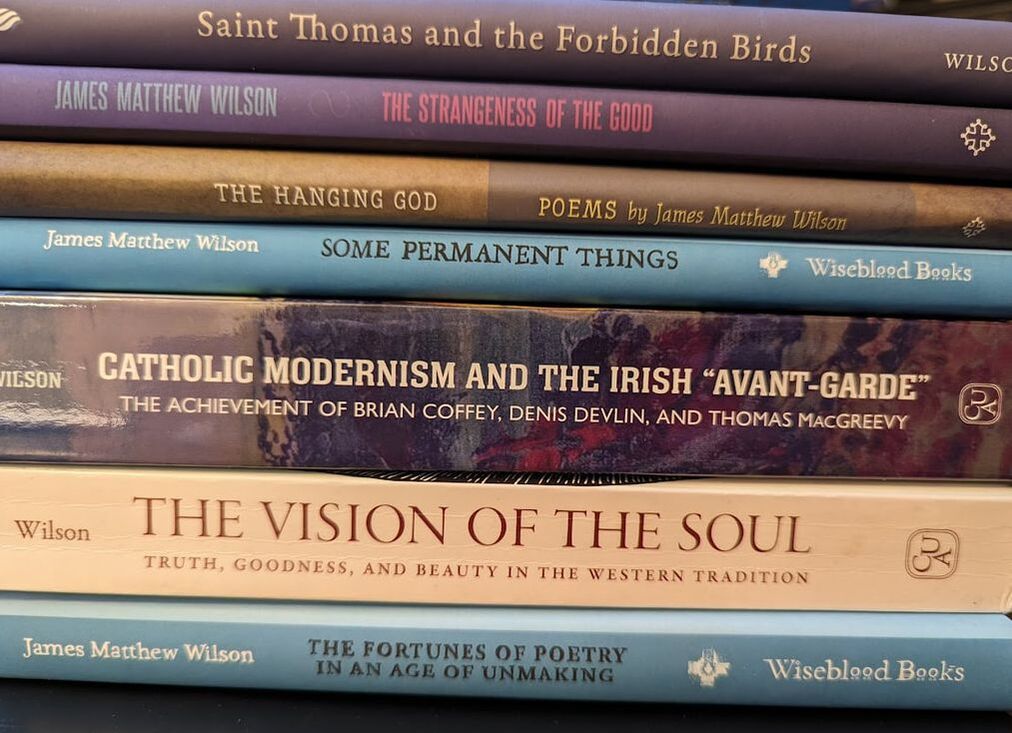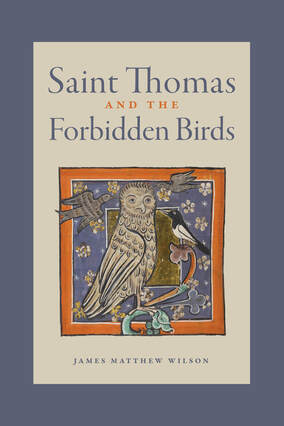
It was a delight to be absorbed by every one of these stunning poems. Each one is a work of exquisite depth, observation, complexity, and form. In each one, the poet touches on the biggest questions that face humanity, and gazes deep and long enough at his subject to thrill the reader with his sense of truth and meaning. Reading this book is an emotional and intellectual experience.
- Sally Read, editor of 100 Great Catholic Poems "The darkness" is coming for us—the darkness of sin, of loss and of forgetfulness, of who we are and who God is. And yet, just when you want to shut the darkness out, James Matthew Wilson invites us to crack open our hearts "so truth may not die in the ear / But, suitably disguised, appear." Just when you think you know something—a lilac, a garden, the Church, a tow-truck driver—Wilson entices us to look closer. Within every created thing, person, or place dwells a mystery to behold, a surprise for us if we can stay attentive and humble. In Saint Thomas and the Forbidden Birds, Wilson offers us a holy resistance to the darkness coming—to swap our narrow and limited vision for eyes infused with grace. -Colleen Hutt, Director of Vision and Outreach, Well-Read Mom This book is golden. -Rod Dreher 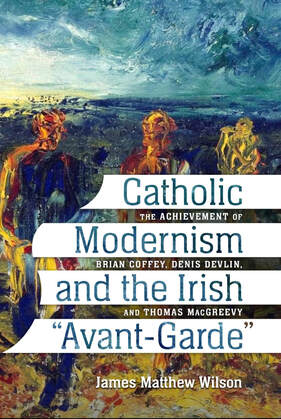
James Matthew Wilson should be congratulated for revealing the Catholic roots of the three modern Irish poets who drew inspiration from St. Augustine, Jacques Maritain, and Michel de Montaigne. Among the book's many accomplishments, Wilson pulls down the barrier put up by so many Catholics between their faith and modernism in art. He shows that the Catholic tradition itself is far from monolithic, it contains three distinctive perspectives that touched the heart and fueled the inspiration of three poets who found their voices to praise God.
-Deal Hudson, Host, Church and Culture James Matthew Wilson is a true poet, a true philosopher, and a true Catholic. He is, therefore, perfectly placed to understand the poetry, philosophy and Catholicism of Coffey, Devlin, and McGreevy, three of the finest poets of the Irish avant-garde. He shows their connections to other great poets, such as T.S. Eliot, and their indebtedness to great philosophers, such as Augustine, Aquinas, and Pascal. He also shows how literary modernism can counter theological modernism, the dynamic orhtodoxy of the former undermining the stale and stolid heterodoxy of the latter. In doing so, he champions the perennial dynamism of the Heiliger Geist over the transient shallowness of the Zeitgeist. Lovers of the goodness, truth, and beauty of great poetry will rejoice that these three poets have found such a champion. -Joseph Pearce, author of Catholic Literary Giants 
From the beginning of his career as a poet and critic, T. S. Eliot was associated with his Victorian predecessor, Matthew Arnold. In this essay, an introduction to the life and work of Eliot, James Matthew Wilson argues that Eliot sought to correct and deepen Arnold throughout his career. Whereas Arnold celebrated poetry as both a substitute for religion and a way of maintaining moral and cultural standards in an increasingly secular and anarchic age, Eliot recognized that nothing could be a substitute for anything else. Religion was not to be contained within culture as one object among others. Rather, culture was itself an expression of the sacred realm which transcends it. In his response to Arnold, Eliot insists that far from preparing us for a modern age where all will be reduced to the “natural,” it is the poet’s task to recover the “supernatural” and to give critical and poetic expression to the sacred in our day. Although he could not have known it, from the beginning Eliot’s career led him down a path that would culminate in Four Quartets, the greatest religious poem of the twentieth century.
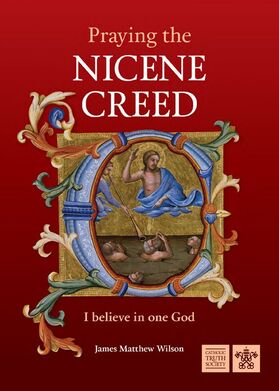
In this book, poet, critic and scholar James Matthew Wilson considers each line of the Nicene Creed in turn, showing through stories, images and recollections that, far from being a dry, clinical formulation of the Faith, this prayer describes the living theological reality that is at the heart of personal devotion.
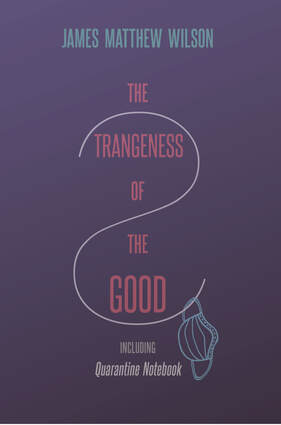
There are poets who, alas, can only feel. And poets who, regrettably, can only think. James Matthew Wilson can do both. And in this substantial collection of sensuous and sonorous verse, Wilson gives evidence of being a major talent whose body of work grows steadily towards beauty and wisdom.
-Robert Royal, President, Faith & Reason Institute James Matthew Wilson makes the everyday lyrically urgent and memorable. Few poets writing today write with such unfailing elegance, close attention to the human world, and generosity of spirit. -Kevin Hart, Edwin B Kyle Professor of Christian Studies, The University of Virginia The Strangeness of the Good is a beautiful act of faith . . . As we seek to see and reflect God’s beauty in the world, these poems will help you be enchanted with the Divine life – in these times when the world needs us to be that hope in the world! -Kathryn Jean Lopez, Senior Fellow, National Review Institute, editor-at-large, National Review 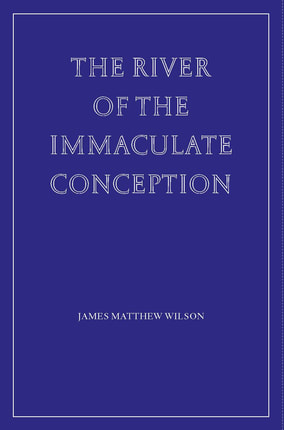
In music as intimate and vital as that of auricle and ventricle, Wilson brings a story as uniquely American and Catholic as possible. Deeply informed by history as well as image, these lines sing a tight, glorious song in honor of the Blessed Virgin Mary.
-Sarah Cortez, President, Catholic Literary Arts Here are familiar stories, given fresh life in verse: the roses in the tilma of Juan Diego; the journeys and sufferings of Junipero Serra, Rose of Lima, Isaac Jogues, Martin de Porres, Pere Marquette; the sorrows and joys of Elizabeth Seton. Alongside them, in a Eucharistic simultaneity, Wilson juxtaposes moments from the present day: sacraments taking place in a cathedral for “brides and mourners;” childhood lessons and liturgies in a “lakeside chapel / Modest and plain, shaped like a wooden boat;” Wilson’s visit with his wife and young daughter to the California missions. These contemporary moments act as a counterpoise to ground us in familiar, lived reality: to place the life of sainthood not impossibly out of reach but close, local, within our scope and ambit. -Katy Carl, Dappled Things 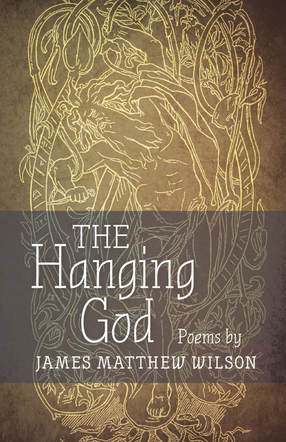
In The Hanging God, James Matthew Wilson mines the landscape of contemporary American life for images to reflect its moral ravages. Raw in their affective power, Wilson’s narratives avoid ambiguity in matters of faith without sacrificing complexity of feeling, compassion, and self-examination. Strippers, divorcees, corporate accountants move among dumpsters, barrooms, bedfellows, beer bottles, and Excel spreadsheets, while the poet examines our confused postmodern responses to these tragicomic figures: would I ‘weep or smile’ at their worldly losses? Yet the narrator of these poems calls a sin a ‘sin’ and does not allow his readers to make excuses for our moral weaknesses.
-Mary Ann B. Miller, Editor Presence To read The Hanging God is to experience the ordinary world transformed by sly artfulness into a place filled with mystery and meaning. James Matthew Wilson is a poet who works like a priest, rendering the elements of quotidian life—its sublime gifts and severe mercies alike—into bearers of sacramental grace. Wilson sees deeper than we do; and in these poems, with lucidity both stark and humane, he reveals profundity hidden beneath everydayness. -Rod Dreher, The American Conservative 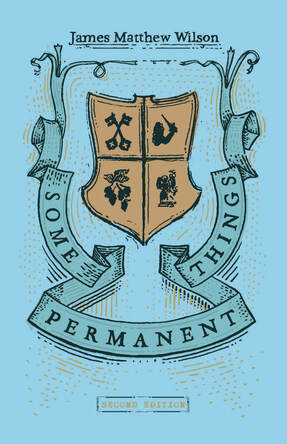
Second Edition, Revised and Expanded
This is James Matthew Wilson’s first full-length book of poems, and a singularly powerful announcement it is . . . philosophy, metaphysics, theology, the American political scene viewed through the complex lenses of the classics, with allusions ranging from the ancients to the moderns . . . all woven into a complex music which has anchored itself in the long tradition of meter and rhyme. . . He is a word painter . . . with the eye of someone for whom the essential being of things—the quiddity, the inscape—leads again and again into a deeper mystery. Here is a serious poet, not yet forty, who is, I can only hope, at the beginning of a long and illustrious journey in the best and most profound tradition of Dante, Hopkins, David Jones, Auden, Eliot, and Franz Wright. -Paul Mariani, author of Ordinary Time and Gerard Manley Hopkins: A Life In James Matthew Wilson’s newest collection of poems he continues to show his command of major themes of many ranges of contemporary experience in a style that is unusually complex, but always exact, profound and deeply insightful. In this new book, his best poems, those concerning matters of the soul, place him among the finest poets writing today. -Helen Pinkerton Trimpi, author of Taken in Faith 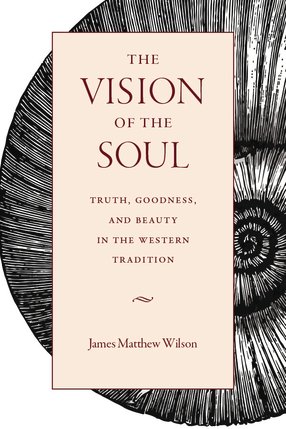
This book will undoubtedly propel Wilson into the first rank of conservative public intellectuals . . . The Vision of the Soul is a defense of Christian Platonism, which Wilson says is at the core of the Western intellectual tradition . . . Wilson's book gives a defense of the Western tradition that is breathtaking in its depth and clarity, conveyed in prose that genuinely delights with its elegance, lucidity, and splendor. I have never read a book in which content so profound takes flight with such lightness and style. It's like watching a 747 maneuver with the grace and precision of a hummingbird. Future generations of conservatives will look back to their encounter with The Vision of the Soul with the same sense of gratitude and awe that we today remember the first time we read Richard Weaver and Russell Kirk. This book is not only true and good, but also beautiful.
-Rod Dreher, The American Conservative James Matthew Wilson is truly alive with the wonder of Creation and with the Logos that gives it meaning. He is also truly a master of words, weaving them so that they are carriers of the goodness, truth, and beauty of which he writes. In the words of Hopkins, Wilson's words are "dovewinged" and "carrier-witted". They lift us into the presence of the very essence of reality, its being, so that our minds and hearts might be opened, dilated, to the goodness, truth, and beauty which is the triune splendor of love. -Joseph Pearce, author of Catholic Literary Converts 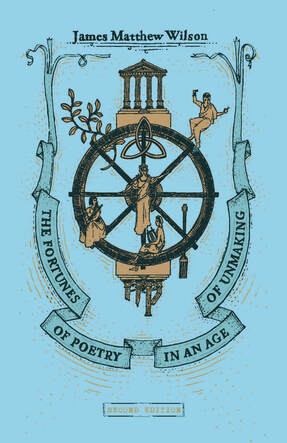
What is poetry and what is poetry for? To ask the first question is to ask the second. To answer both questions in light of the western tradition stretching back to Homer, and against much modernist and postmodernist poetic theory and practice, is the goal of this remarkable book. Poetry’s final end is nothing less or other than to arouse in us a profound sense of wonder in coming to know, as Wilson says, that “Reality as a whole is formed as the good-world-order, the intelligible beauty showing forth from [the] cosmic circle of procession and return.” With this in mind, Wilson clearly demonstrates that poetry has become deficient not only in form but also in matter—and in logic and grammar as well. How far poets have fallen away, both in theory and in practice, from an understanding of the nature of metrical composition is the subject of this book’s earlier chapters—chapters filled with Wilson’s razor-sharp wit, skillfully employed in his analysis of what too often passes for poetry at present.
-David Middleton, author of The Burning Field 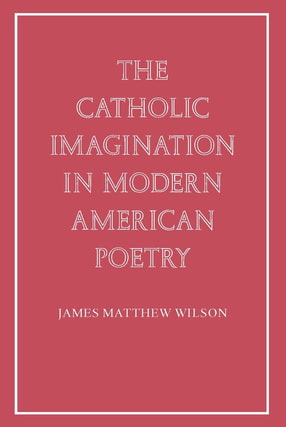
In The Catholic Imagination in Modern American Poetry, poet and critic James Matthew Wilson offers a succinct summary of how Catholicism’s unified and sacramental vision of the world influenced some of the twentieth century’s most original voices. His elegant and sure-footed treatment of work of nearly 20 poets—from George Santayana’s aesthetics of ascent to Dana Gioia’s dramatic lyricism—make this is essential reading for any student of modern American poetry.
-Micah Mattix, The American Conservative 
James Matthew Wilson's poems are those of a searching, philosophical, and subtle mind treating themes of the inner and outer life of our contemporary world. Understanding our human nature as inevitably "violent and abyssal," as St. Augustine wrote of infants at their mothers' breasts, he affirms that we must negotiate successfully between "discipline and desire" to build a satisfactory life.
-Helen Pinkerton Trimpi, author of A Journey of the Mind 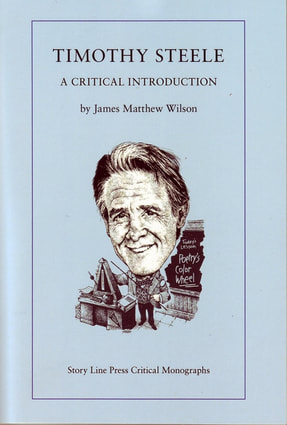
Remember the new formalists, who insisted on bringing meter and rhyme and form back into the American poetic mainstream? Well, take this first full collection [Some Permanent Things] by a poet of the generation after theirs as a solid indicator of their success. Wilson writes formal verse as if it were the air he breathes; his sonnets, sestinas, and such are as natural as his blank verse.
-Ray Olsen, Booklist In the versatile fluency of meter in Steele's poetry, Wilson finds evidence that meter is not an inauthentic human artifice obscuring natural realities. Rather, this versatility of meter helps establish that "the imagination is not in competition, but in harmony, with nature," a harmony so complete that it manifests "the compatibility of nature and spirit." -Bryce Christensen, Modern Age 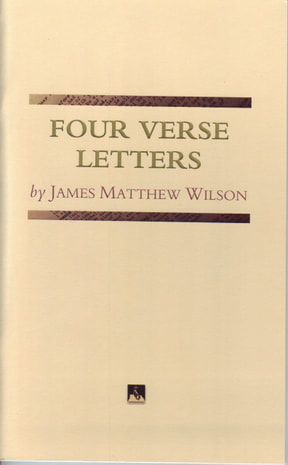
James Matthew Wilson’s Four Verse Letters consists of four epistolary poems. Wilson addresses his father, mother, and two brothers in smooth rhyming pentameters. Although he is associated with Dana Gioia and the West Chester New Formalists, he is perhaps more of an old formalist. These poems have something of the feel of MacNeice’s Autumn Journal.
-Notre Dame Review Learn more about books by James Matthew Wilson or purchase them by clicking the picture below.
| ||
Proudly powered by Weebly
|
